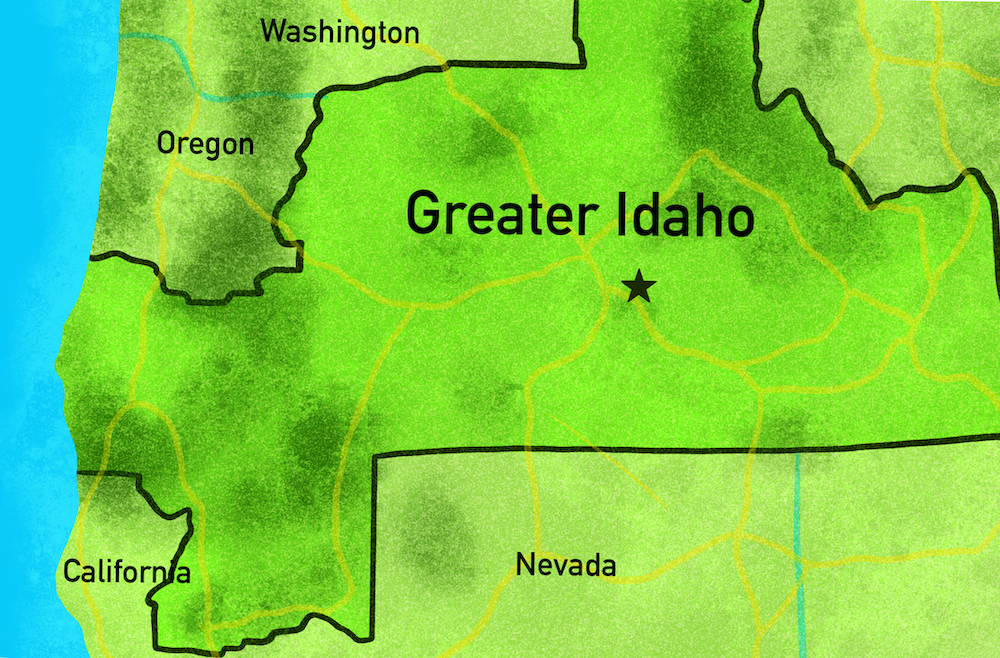Many residents of rural counties in eastern Oregon have grown weary of their decreasing political power. The solution? Join an existing red state.
Lawmakers in Idaho are entertaining an idea that would involve their state expanding to encompass nearly 75% of Oregon and a portion of northern California. This idea was “a movement born of frustration with a state Legislature perceived by some conservatives as too liberal and indifferent to rural concerns,” according to The Oregonian.
In Oregon, the Willamette Valley divides the state between east and west and is home to approximately 70% of Oregon’s population, with most folks residing in cities such as Portland, Eugene, Salem, Gresham, Hillsboro and Beaverton. These cities also lean Democrat.
The legislation passed in these progressive cities—such as the decriminalization of certain hard drugs—affects not only the immediate environment but extends outward into rural communities that tend to lean Republican. Many such Republicans are concerned with the leadership in Oregon and the overwhelming Democrat direction it’s taking.
Mike McCarter, the leader of the Greater Idaho movement, referred to Oregon as a “sanctuary state” that essentially caters toward houselessness, hard drug use, rioting and undocumented citizenship. He also made it very clear that that’s not the way conservatives feel in Oregon.
“What takes place in the Portland area has a big impact on those rural parts of Oregon,” stated Governor of Idaho Brad Little. “They’d like a little more autonomy, a little more control, a little more freedom. I fully understand that.”
There seem to be two schools of thought surrounding the feat of making the Greater Idaho proposal a reality. One idea is that if residents in rural areas want to live in Idaho, they should just move—and not spend time restructuring the state’s borders.
On the opposite side of the coin, many individuals living in communities east of the Willamette are born-and-raised Oregonians and don’t feel like they should have to—and don’t want to—move to Idaho. They just want to live in a place where they are “insulated from the liberal influence of large urban centers that tend to vote Democratic,” according to East Idaho News.
Moving Oregon’s border would essentially allow the liberal cities to remain as they are, keeping their politics and legislation in place—and not affecting the rest of the state with it. Those who want to live in those particular cities can move there or stay put, and rural Oregonians can join Idaho, which is more synonymous with conservative values and tradition. That way, both Democrats and Republicans can benefit from the process.
Such a movement would have benefits extending beyond appeasing residents’ political beliefs, though. It would also extend Idaho’s environmental, energy and resource jurisdiction over a much greater area, contributing to the growth of both timber and mining industries. It would also increase tax revenue per capita in the state.
The Greater Idaho group is looking to have 22 of Oregon’s 36 counties vote on the question, “Should the county commissioners advocate for the Idaho border to be relocated to make this county a county of Idaho?”
A minimum number of signatures would be required on the ballot to move this idea forward. Petitioners with Move Oregon’s Border and People Not Politicians have argued the imposed COVID-19 restrictions have made traditional signature-collecting techniques more difficult than usual.
Such difficulties, the petitioners state, violate both the First and Fourteenth Amendments of the United States Constitution because they “effectively block voters from any chance to consider their proposals.” This issue was taken to the courthouse, and the judge agreed the state must reduce the required number of signatures, making it more feasible for the petition to reach the ballot.
Even if the necessary amount of signatures are collected, shifting Oregon’s geographical boundaries would require approval from Oregon’s and Idaho’s state legislatures—and Congress.
Before any lawmakers are involved, Move Oregon’s Border wants to poll residents of 17 different counties to get their opinion about whether they would like to switch states or not. This would be different than a traditional statewide ballot measure because it would entail slightly different requirements.
It has been challenging for the group to gain momentum due to the restrictions on large gatherings to mitigate the spread of COVID-19, which no one was prepared for.
Volunteers are still working on collecting signatures—albeit slowly— and are aiming to have their proposal on the ballot this November.
The proposal, although unlikely to pass, would make the legislative process in Oregon much easier, doing away with the Republican obstruction that Luke Harkins wrote about in Portland State Vanguard this week. Democrats in the liberal cities of western Oregon should allow the red counties to secede—for both parties’ benefits.



